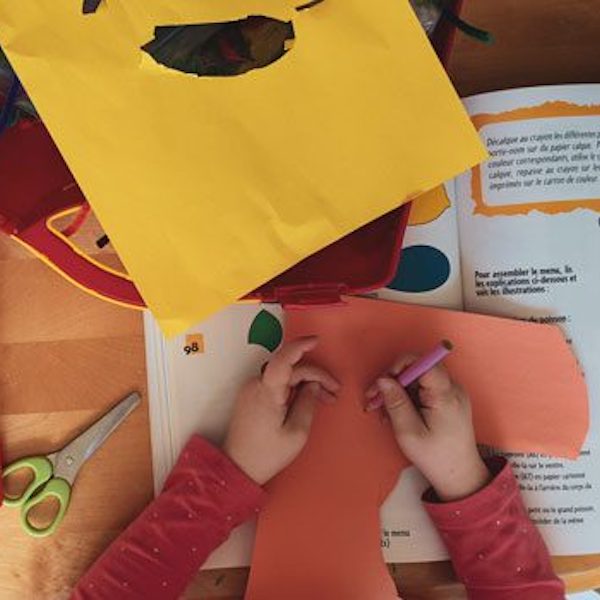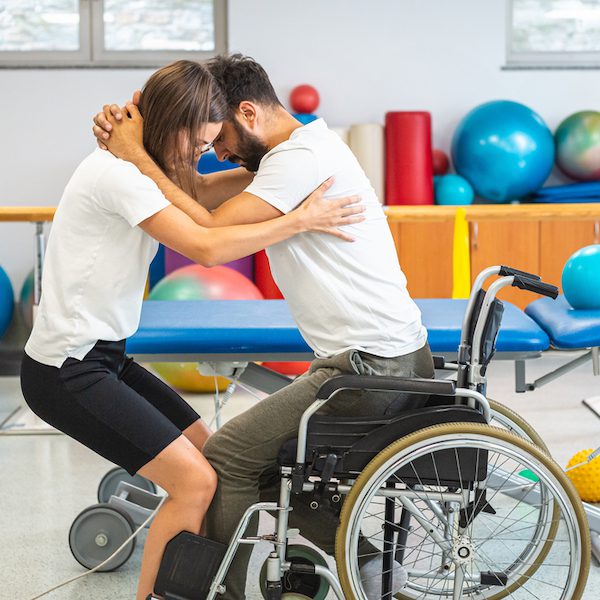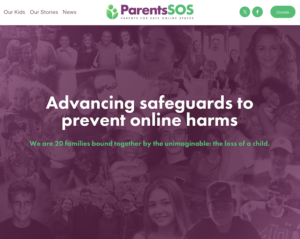The ways in which we are raising and educating children with technology are not sustainable. Isolated, neglected, overstimulated and sedentary, the new millennium child is struggling to survive. Adult difficulty managing their own devices is eroding parenting skills and negatively impacting worker wellness and productivity. It’s as if we are all blindly travelling on a “Tech Train” going 100 mph and even though humans are falling off, no one seems to notice. In my role as an occupational therapist, biologist, author, activist and child advocate, I have woven together my training and years of experience with current research, to create a unique and timely series of webinars. Reconnect Webinars are designed to highlight problems associated with screen overuse and guide teens, parents, teachers, clinicians and workers, to begin the process of managing balance between screens and healthy activities, termed Balanced Technology Management (BTM).
Reconnect Webinars brings together all the major players that contribute to screen overuse (kids, parents, teachers, clinicians, government, researchers and technology production designers/corporations) to create a ‘system of solutions’ for screen overuse. This team concept allows participants to move forward together toward universal and effective BTM strategies. The three different categories of Reconnect Webinars are as follows:
Technology Management Webinars Series
Technology Management webinar series for teens (free), parents, educators and clinicians. Technology Management (TM) webinars profile child and youth technology usage rates, expert guidelines and screen impact research in five domains: physical, social, emotional, mental and cognitive. The teen Screenbuster Program is profiled in educator webinar with Screenbuster training delivered in teen webinar. Outcomes are managed balance between screen use and healthy activities in home, school (classroom, gym, playground), clinic and community-based settings. There are a total of 12 TM modules of ~ 3 hour duration for $100 each, or full series of 12 modules for $500 for parents and $750 for teachers and clinicians; modules 1 and 12 as well as teen webinar are FREE.Child Development Webinars Series
Child Development webinar series for educators and clinicians. Child Development (CD) webinars cover sensory, motor and attachment foundations for enhancing child development, behaviour and learning in home, school and clinic settings. Outcomes are improved child activity engagement and skill performance with implementation of 4 critical factors for optimizing development: movement, touch, human connection and nature. There are a total of 6 CD modules ~ 3.5 hour duration for $100 each, or full series of 6 modules for $500.Workplace Ergonomic Webinars Series
Workplace Ergonomic webinar series for workers and employers in the health, general labor and office sectors. Workplace Ergonomic (WE) webinars address strain injury identification, treatment and prevention and the use of 4 ergonomic principles: position, pace, plan, prioritize to redesign worker and workplace for enhanced productivity. Outcomes include reduced injury incidence and improved worker wellness through initiatives to enhance physical and mental health e.g. stretching, fitness, entertainment-based screen reduction and relationship building initiatives. There are a total of 3 WE modules ~ 3.5 hour duration for $100 each.
More About the Technology Management Webinar Series
Child development theory indicates that growing a child is like building a house…it’s all about the foundation. Children and teens right through adulthood all require 4 critical factors to optimize growth and success: movement, touch, human connection and nature, all of which are grossly limited when using screens. Movement builds a strong core, which optimizes motor coordination and mood, thus enhancing literacy and productivity. Touch activates the parasympathetic nervous system for reduced adrenalin and anxiety and induced calming and focus. Connection (or attachment) is life sustaining without which humans can’t thrive or survive. Nature is sensory soothing, promoting optimal attention, learning and behavior. Balancing screens with these 4 healthy activity pursuits will serve to create sustainable futures for all of humanity. Balance Technology Management is a salient theme throughout Reconnect Webinars which focuses on increased engagement in healthy activities rather than focus solely on screen reduction/elimination initiatives.
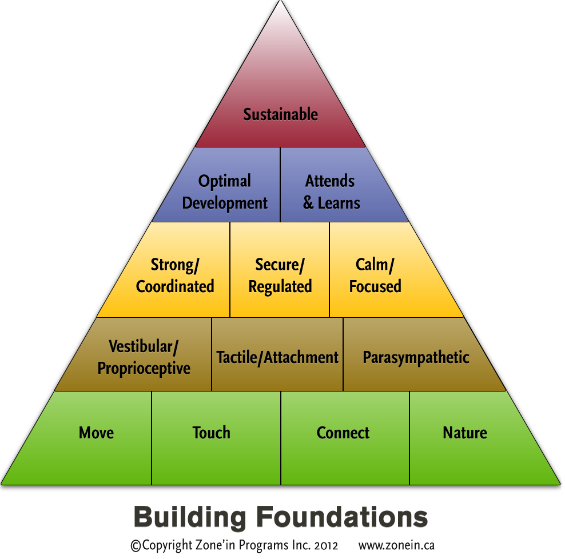
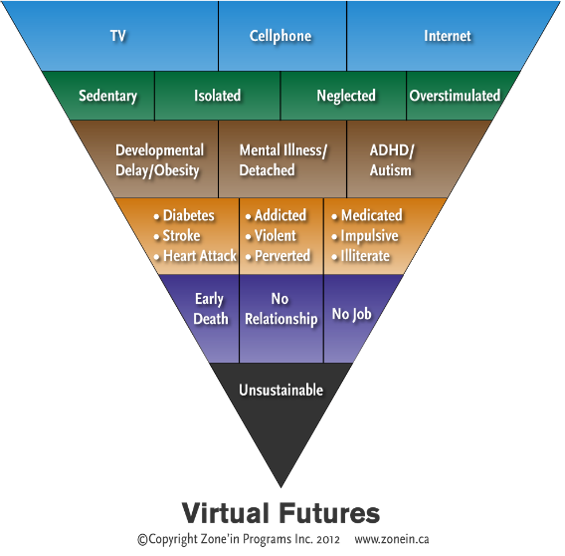
In addition to covering technology trends, usage rates and expert guidelines, Technology Management webinar series profiles extensive research regarding the impact of screen overuse in the following child developmental domains:
- Physical (developmental delay, obesity/diabetes, cardiovascular fitness, hyperarousal, vision, melatonin/vitamin D, sleep deprivation and eating disorders)
- Wireless radiation (experimental, epidemiological and cancer studies, global initiatives, precautionary principle, safety methods)
- Social (phobia, asocial, antisocial, social media, videogames, pornography, hate/radicalization)
- Emotional (problem behaviours, identity, motivation, independence, challenge and risk, self-regulation, aggression, violence, cyberbullying)
- Mental (parent-child attachment, mental health, Adverse Childhood Experiences research, mental illness including depression/anxiety/adhd/autism/addiction, Unplug – Don’t Drug misdiagnosis and medication, data privacy, security, persuasive design)
- Cognitive (edtech trends, creativity crisis, Covid impact, screen impact research including declining literacy/cognitive impairment/multitasking stress/attention deficit/poor productivity, considerations for screens in school).
10 Child Harms / 10 Child Rights
Reconnect Webinars – Technology Management webinar series exposes the following ‘10 Child Harms’ or ways in which screen overuse has harmed children and youth. Reconnect Webinars then profiles ‘10 Child Rights’ as a framework to guide teens, parents, teachers and clinicians toward effective tools and techniques to balance screens with healthy activities. 10 salient themes in Reconnect Webinars encompass compassionate values and innovative thinking needed to help achieve sustainable futures for all children.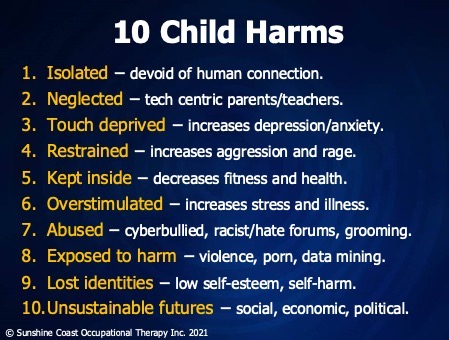
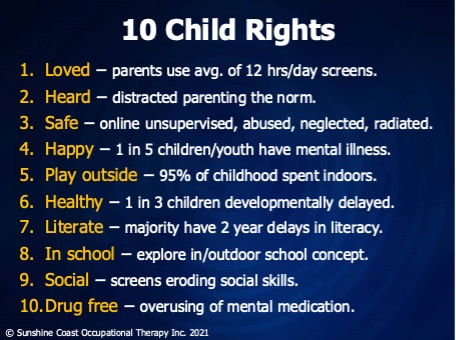
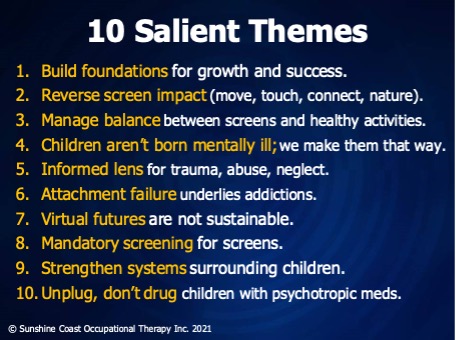
Reconnect Webinars Research
Reconnect Webinars are research referenced from a growing body of studies topically listed in the Reconnect Webinars Fact Sheet found in Resource section of website. Following are just a few of the cited research evidenced topics in Reconnect Webinars.
The Problems
- Unrestricted screen use: while pediatric experts recommend no more than 2 hours per day total screen time for children ages 6-12 years, children are using 3-4 times that amount.
- Disconnected and neglected: parents on average use 12 hours per day of entertainment-based screens. In the absence of parental attention, children are forming unhealthy attachments to screens.
- Child health compromised: pre-covid research data showed screen overuse is associated with 1 in 3 children entering school developmentally delayed, 1 in 4 obese, 1 in 5 have a diagnosed mental illness, 3 in 4 teens are sleep deprived, 1 in 11 are addicted to video games and 50% of teens report addiction to smartphones.
- Screen overuse adversely impacting brain development and learning: higher screen use in young children correlates with brain development including decreased cortical thickness and sulcal depth resulting in sensorimotor and cognitive impairment.
- Then came the pandemic: Covid doubled time children spend on screens. Covid doubled child anxiety and depression diagnoses, problematic behaviors and increased incidence of myocardial infarction in the 25-44 year old population. Children who overuse screens age 1 have higher incidence of autism age 3; also termed Virtual Autism.
- Along with medication of child behavior: psychotropics are increasingly prescribed for off-label, undiagnosed problematic behaviors. Virtual assessments may result in increased Rx of psychotropics as first line intervention.
- Screens in schools soared: despite OECD report in 2015 showing online learning results in declining academic performance, during Covid schools were mandated to force children into online learning adding up to 7 hours screen use per day further contributing to poor child and parent mental health.
- Children safety compromised: online learning and use of cell phones in schools is largely unsupervised resulting in increased access to harmful content. 2021 study by Internet Safety Labs in 50 US states showed 96% of K-12 school apps share children’s personal information with third parties, 78% of the time with advertising and data analytics entities without the knowledge or consent of the users or the schools.
- Academic performance plummeted: Extended digital learning during covid resulted in the largest deterioration in math achievement on record (5 points in grade 4, 8 points in grade 8) a 3-point reading slump. NAEP goes on to state “If left unaddressed, the life trajectories and opportunities of a whole cohort of young people could be permanently altered”.
- Cheating became the norm: The Wall Street Journal reports that schools see a “surge in academic dishonesty” with online classwork; Forbes reports that 60% of teachers find cheating more prevalent with online classwork; and another report specifies that students regularly “google answers, text friends or peek at their notes” during an exam when administered online.
The Solutions
- Create sustainable futures for all children: increased access to 4 critical factors for growth and success: movement, touch, connection and nature in home, school and community settings.
- Ensure best practice guidelines in schools: the Canadian 24-Hour Movement Guidelines for Children and Youth recommend at least 60 min physical activity/day, < 2 hrs recreational screen time/day, and 9–11 hrs. sleep per night in children aged 8–11 years all associated with superior global cognition. Balance all screen use with healthy activity.
- Grossly restrict edtech in schools to ensure literacy: higher screen-based media use correlated with lower microstructural integrity of brain white matter tracts supporting language and emergent literacy skills. compile screen use data from teachers, set best practice standards for edtech, require all edtech meet specific criteria including research evidence (not industry driven) and scrutiny for effectiveness.
- Prohibit all entertainment tech in schools to improve health and academics: including movies, video games, social media and porn.
- Bring back books, paper and chalk boards: use of non-internet search tools e.g. encyclopedias is associated with improved storage and recall of sought information in comparison to internet searches; students prefer books to screens due to improved concentration and learning; 2017 research review showed better comprehension outcomes with print rather than with digital texts citing disruptive effect of scrolling on screens.
- Teach children to print: While studies show handwriting skill improves learning speed and generalization to untrained tasks, teachers have reduced handwriting instruction to 13 min. per day in primary grades.
- Ban cell phones from schools: studies show improved learning, behavior and academic performance in schools who ban cell phones.
- Improve playgrounds and physical activity: add “loose parts” for building forts, ensure adequate equipment to achieve age appropriate challenge and risk, add teen and adult exercise equipment for improved physical engagement.
- Improve access to nature: Higher screen time at age 2 years was associated with lower daily living skills, but frequency of outdoor play at age 2 years 8 months alleviated it, suggesting outdoor play mitigated the association between higher screen time and suboptimal neurodevelopment.
Recognized Experts
Reconnect Webinars – Technology Management series includes interviews with the following recognized experts from a variety of fields who happen to be very eloquent speakers and active advocates for better management of screens for children and families:Dr,
- Dr. Hilarie Cash – psych, CCD reSTART Internet Addiction Center
- Frank Clegg – CEO Canadians for Safe Technology
- Joe Clements – teacher, coach, author of Screen Schooled
- Lisa Cline – journalist, Chair Screens in Schools committee
- Dr. Kerry Crofton – psychologist, author Less Screen More Green
- Phyllis Dyson – teacher, author Among Silent Echoes
- Dr. Douglas Gentile – psychologist, researcher, professor, author
- Melanie Hempe – RN, author, founder of ScreenStrong
- Jean Rogers – Director Children’s Screentime Action Network
- Theodora Scaroto – Executive Director of Environmental Health Trust
- Mary Sharpe – lawyer, CEO The Reward Foundation
- Katie Singer – journalist, author An Electronic Silent Spring

Cris Rowan
Ten Child Rights was written in March 2023 by pediatric occupational therapist, biologist, author and speaker Cris Rowan. Cris’s website is Reconnect Webinars, blog is Moving to Learn and book is Virtual Child. Cris can be reached at info@reconnectwebinars.com.









